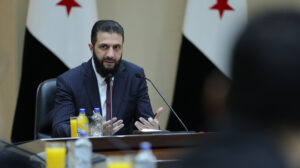President al-Sharaa chairs first meeting of the New Government to discuss priorities of the government’s work during the next period

Damascus, SANA- President Ahmad al-Sharaa chaired the first meeting of the New Government of the Syrian Arab Republic on Monday and gave a direcitive speech that defines priorities of government’s work and challenges faced by the various ministries.
The president affirmed the importance of integration in the work of ministries in order to develop emergency plans that take into account in the first degree, the priority of the Syrian citizen in terms of revitalizing the economy, which will positively impact his daily needs, and repair the great damage inflicted by the ousted regime on the state structure, especially in the economic and financial systems that require urgent measures, in order to provide a safe environment for investment that transforms challenges into huge investment opportunities and drive the wheel of the econo my.
my.
President Al-Sharaa also stressed the importance of the reconstruction file and the necessity of developing strategic plans to organize cities and towns, emphasizing the cultural and civilizational integration with urbanization.
President al Sharaa emphasized the principle of civil peace as a primary factor for government action during the coming period, and related issues such as media discourse, which must be national and inclusive, strengthening national unity and rising above all partitions, as Syria belongs to all its citizens.
The recent developments of important internal issues were also addressed, especially the rebuilding of a professional national army, restricting arms to the state, and the completion of the agreement with the SDF and its various steps to achieve integration into the state’s civilian and military institutions, as well as the military factions in Sweida.
The meeting also reviewed the country’s economic approach and the importance of achieving harmony and integration between the Ministries of Economy and Finance and the Central Bank to overcome the negatives of the past, develop flexible policies that respond to promising opportunities in various sectors by building partnerships between the public and private sectors, and implement plans to enhance domestic tourism, in line with the return of many citizens living abroad.





